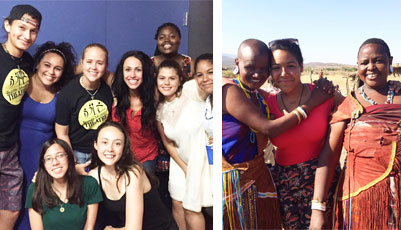
In late July, nine John Jay students took the stage at the IATI Theater on the Lower East Side to showcase dramatic performances of creative nonfiction pieces conceived and written abroad during their recent study-abroad trip to Tanzania under the guidance of Christen Madrazo, a lecturer in the English department and assistant director of the Writing Program.
The study-abroad program was done in collaboration with Dramatic Adventure Theater (DAT), a New York City-based theater company and service arts organization. During the four-day showcase, Madrazo said students shared “intimate accounts that merged their own incredibly diverse life experiences with their on-location observations, interviews, and experiences. As a result, their work was fresh and innovative; they broke traditional travel writing forms in many ways.”
The showcase was the result of ACTion, a 30-day project in which professional performance artists teach storytelling and theater workshops on location in communities around the world that have little or no arts funding. This year, Madrazo, who is also the Education Director of DAT, brought her John Jay travel writing students along on the trip for the very first time, and, according to those who went, the experience was nothing short of life changing.
“Phenomenal to the fullest extent of the word,” was how Karina Velez described it. A senior majoring in Forensic Psychology, Velez said that Madrazo’s travel writing course and study-abroad program “allowed us to take what we learned in creative nonfiction and apply that voice to other experiences using deep travel techniques. We were able to make comparisons and connections between our experiences in Africa, and draw those connections back to everything we had experienced in our lives prior.”
Those experiences in Africa consisted of a packed 30-day itinerary including: safari drives; Tanzanian music/mask dance workshops with tribal leaders; a three-day tour of Bagamoyo, where newly captured slaves from the East African interior last saw their homeland; and the pinnacle of the trip, eight days co-leading storytelling workshops with local children and staff at the Light in Africa orphanage. Light in Africa is home to hundreds of children unable to seek refuge at any of the country’s other shelters, mainly because they are living with HIV and/or severe disabilities.
Ariana Castillo, also a senior Forensic Psychology major, said, “One thing that was different from most study abroad programs is that it let you visit different parts of country, and work with people in the community hands on.” Castillo, Velez, and their fellow students spent eight days at Light in Africa putting together lesson plans, playing theater games with the children, and helping them build the confidence to put on their own performances in front of the local community. “That was something they never expected they could do,” Castillo said, “and by the end we saw a complete change. Students who were completely shy could not wait to put on another play and show us what they could do.”
Back in New York City, the students performed a selection of class-curated final pieces at IATI Theatre as part of ACTion Fest: Tanzania, the showcase at which DAT actors typically share their experiences through one-act plays. The 2016 ACTion Fest marked the first time that creative nonfiction travel narratives were shared at the event.
Madrazo takes a unique approach to travel writing, a genre she criticizes for being traditionally dominated by writers of privilege. “Travel writing is associated with luxury; those who have the time and funds to both travel and write are few and far between, something that greatly limits the perspectives shared in even the most contemporary American travel writing scenes,” she said. Madrazo’s preferred form fuses elements of literary journalism with personal essay writing. “When done well, this form of creative nonfiction invites its audience to learn about a place and to feel connected to it via deep personal connection to the author as a character.”
The students credited Madrazo with bringing out their best work, and inspiring them beyond the classroom. “Christen is truly our fearless leader. She’s just this ball of light that comes into you,” said Velez. “I hold her in such a special place.” Castillo added, “I knew a lot about her and how much time and dedication she gives to her students, but I didn’t experience that one-on-one until I was in Tanzania.”
Madrazo was just as unstinting in praise for her students. “I believe that my students were able to connect more deeply than some travel writers ever have the opportunity to do,” she said. “Their final pieces all exhibit such powerful fusions between seemingly disparate experiences, places, and people. Our active participation with local students and communities really forced us all to think critically, to connect in ways that made us realize that things are often more complicated than we’d sometimes like to admit. That recognition is at the core of all good writing.”
Madrazo plans to record her students’ travelogues for her on-campus literary nonfiction podcast series, Life Out Loud, which is available on iTunes or at www.lifeoutloudpodcast.com.



